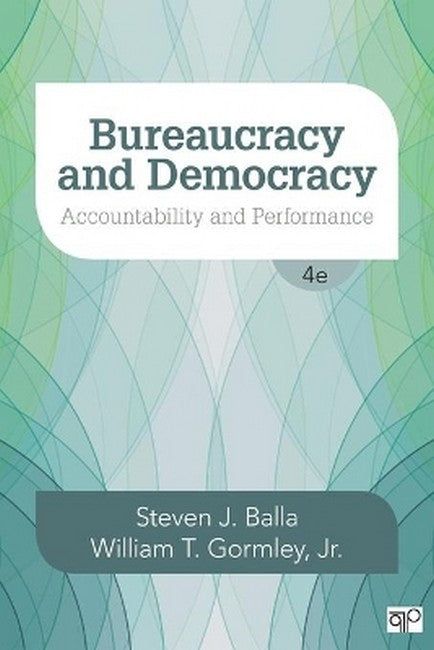Steven J. Balla is associate professor of political science, public policy and public administration, and international affairs at George Washington University. He is also a research associate at the George Washington Institute of Public Policy, and a member of the International Working Group on Online Consultation and Public Policy Making. William T. Gormley Jr. is University Professor and professor of government and public policy at Georgetown University. He is the author of several books, including Organizational Report Cards, with David Weimer and Everybody's Children: Child Care as a Public Problem.
Request Academic Copy
Please copy the ISBN for submitting review copy form
Description
Chapter 1: Bureaucracies as Policymaking Organizations The Contours of Public Bureaucracy Accountability and Performance in Public Bureaucracies Accountability and Its Many Faces The Push for Performance Accountability and Performance: Theories and Applications Chapter 2: Bureaucratic Reasoning Bounded Rationality Simplified Problem Solving Evidence-Based Research Implications for Policy Analysis Motivation Consequences of Bounded Rationality Conclusion Chapter 3: The Bureaucracy's Bosses Delegation, Adverse Selection, and Moral Hazard Why Bureaucracy? Managing Delegation Principal-Agent Theory and the Bureaucracy's Clients Principals and Principles Chapter 4: The Bureaucracy's Clients The Benefits, Costs, and Politics of Public Policy The Rise and Fall of Iron Triangles The Venues of Client Participation Client Influence on Bureaucratic Policymaking Clients and the Institutions of Government Client Participation: Three Lessons and Beyond Chapter 5: Bureaucratic Networks Networks versus Hierarchies Network Theory The Tools Approach Types of Bureaucratic Networks Network Effectiveness The Effectiveness of Policy Tools Networks and Public Bureaucracy Chapter 6: The Politics of Disaster Management The Gulf of Mexico: Two Crises with Precedent September 11, 2001: A Crisis without Precedent Avian Influenza: A Crisis in the Making? Evaluating Bureaucracy in Light of the Theories Chapter 7: Why Are Some Bureaucracies Better Than Others? Rating the Performance of Agencies Explaining Variations in Performance Alternative Ways of Gauging Agency Performance Bureaucracy in the Twenty-First Century
This is the best single overview of bureaucracy and how it fits in our democratic system available. The book elegantly weaves a nuanced understanding of bureaucracy itself with the functioning of agencies in a political system. Readers will learn a tremendous amount. Balla and Gormley know their stuff and they share it in an engaging and accessible fashion. The book includes clear frameworks and contemporary examples to help readers make sense of this complex but important topic. -- David E. Lewis Employing a series of timely and engaging illustrations, Balla and Gormley walk readers through the key theoretical approaches to modern bureaucratic governance. The result is a sophisticated but accessible treatment of the complexities of bureaucratic performance and accountability. This is a go-to resource for those interested in understanding what is at stake when it comes to the administrative state. -- Rachel Augustine Potter "Bureaucracy and Democracy delivers on the longstanding promise that professors make to students each year: that theories of bureaucracy and democracies matter in very practical and applicable ways, and that to understand bureaucracy you need to understand democracy (and vice versa). Students who read this book will have that 'a-ha' moment about all these connections. That, to me, is worth the price of the book." -- Lonce Bailey "Bureaucracy can be a dry topic to teach and study; Balla and Gormley make it accessible and fun. The book provides a wonderful overview of the theories behind bureaucratic decision-making, as well as the political and other challenges faced by administrative agencies." -- Lydia Tiede

